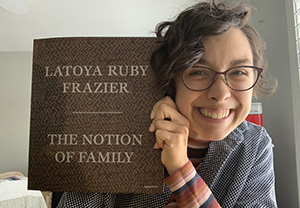
While my time spent on Bowdoin’s campus may have been brief this fall, it was certainly not lacking in formative experiences, my trip to the Special Collections and Archives chief among them. Having spent the former part of the semester voraciously consuming each of their “Beyond the Reading Room” virtual events from the isolation of my dorm room, my heart nearly burst when I was informed we Contemporary Art 1020 students would be visiting this sacred, mystical space in person. To ice the cake, we would be viewing a curated smorgasbord of artists’ books exploring themes of feminism and protest art. If spontaneous combustion ever posed a threat, my excitement seemed a tragic catalyst in that moment. For brevity’s sake and in service of Latoya Ruby Frazier, I will simply mention that the tactile, aesthetic, powerful, transmutative, and profoundly emotional experience I had with those artists’ books that fateful afternoon unlocked a passion buried beneath years of hand-cramping Lewis structure drawing and drilling what makes a Latin ablative absolute construction (verb of the head plus accusative subject plus infinitive, if you were curious). Don’t get me wrong here, I can appreciate the beauty of a Lewis structure and that butterflied heartbeat upon discovering an ablative absolute hidden within Caesar’s De Bello Gallico just as much as the next person, but these artists’ books, they were transcendental. Their power to reveal truths I had never given even an infinitesimal moment of thought to, the ways in which their existence challenges the very medium, themes, and conventional ideas about such concepts simply by virtue of being. Book and art seem a duality of opposites, in some ways. Books require time, active participation, and occasionally forced, more often willful critical thought and engagement. Art, broadly speaking, requires far less temporality and touches some part of one’s being words can never seem to reach. Of course, the intersection of these concepts, book and art, are contested and hairy indeed. What constitutes a book? What are the criteria for deeming a book, a piece of art, an “artists’ book? These grand questions continue to permeate the discussion of artists’ books, but I think these constant challenges only add to their magic. This interest of artists’ books in revealing truth viscerally and emotionally stands alongside their dualities, in uniting concepts thought to be well understood only to be destabilized. This contemporary artist Latoya Ruby Frazier intimately understands, and places center stage in her photographic archive The Notion of Family.
The Notion of Family is a fourteen year photographic collection of contemporary artist Latoya Ruby Frazier and her family’s survival of the plights of racism, environmental toxicity, inadequate access to healthcare, poor housing, and poverty in the rust belt town of Braddock, PA. Frazier’s photos are black and white gelatin silver prints reminiscent of the social documentary style of Dorothea Lange’s Migrant Mother and Gordon Parks’ American Gothic (Ella Watson). This aesthetic choice would imply an archival history of sorts, and yet the artist chooses not to photograph outside members of her community, but herself and her own family. Just as well, the book is organized and framed as a “family photo album”, the tragic images of her dead grandmother and Frazier’s own nude, deteriorating body challenging what images, what people, what places are seen in such albums. Frazier crafts an incredibly moving unity of warring concepts through her work, and forces viewers/readers to transform their conceptions into notions, as it were. She reveals to her audience the truth of impoverished, Black, working class, environmentally poisoned individuals utterly erased from American history through the intimate lens of her own family. In revealing this truth, Frazier provokes undeniable questions in her audiences regarding what, what, when, where, why, and how photos are viewed, and what photography has done to marginalized communities throughout American history. Concepts of what makes a family, who is worthy of being photographed, who has built this nation, what poverty really looks like, etc. become notions through Frazier’s work. Those once firmly held beliefs become abstracted, become interrogated, and, hopefully, ultimately become transformed in light of truth. This is the power of Latoya Ruby Frazier, of artists’ books, and a power so necessary for this contemporary moment.
During this weird, tragic, taxing moment in which we find ourselves, The Notion of Family may not uplift your spirits, but it will do some truth revealing so crucial to existing and progressing as human beings past this period of peril. Let yourself feel, question, be uncomfortable, but do not let the experience of this work sustain personal apathy thereafter. This magnificent artwork calls for so much more than a momentary emotional catharsis. Recognize what it asks of you, and act.
Additional Supplemental Reading Alongside Frazier’s Work:
- Invisible Man by Ralph Ellison
- “In, around, and Afterthoughts (on Documentary Photography)” (essay) by Martha Rosler
- Heart Berries by Terese Marie Mailhot
And check out some of Frazier’s additional work!
